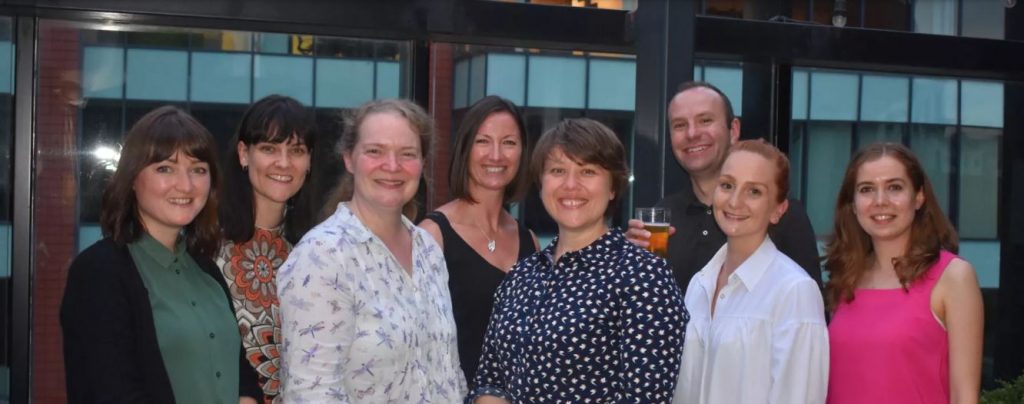
PPIE Award Winner: ACES-LGBTQIA+
In this blog series we will be featuring our award winners and highly commended recipients from the Faculty’s ‘Outstanding Contribution to PPIE’ awards. Showcasing the inspirational and outstanding commitment to PPIE that has made a positive difference to our community and highlighting the amazing events, activities, people and groups from across the Faculty.
Our next blog in this series will feature ACES-LGBTQIA+ (Alternative CErvical Screening – Lesbian, Gay, Bisexual, Transgender, Queer/Questioning, Intersex, Asexual\Agender plus). They are a group who seeks to determine the acceptability of self-screening options, including urine testing, as an alternative to cervical screening within the LGBTQIA+ community. ACES-LGBTQIA+ was joint winner in the Inclusivity category in the 2022 awards.
Cervical screening is a test to help prevent cervical cancer. During screening a cervical sample, previously called a ‘smear test’, is taken and checked for high risk types of human papillomavirus (hr-HPV), which are responsible for 99% of cervical cancer cases worldwide.
In the UK, there are around 3200 cases of cervical cancer every year, yet it is easily preventable if regular cervical screening takes place and subsequent successful treatment of those who have precancerous changes to the cervix. Around two in three eligible individuals attend cervical screening with attendance being even lower in the LGBTQIA+ community. This represents health inequity with a higher risk of cervical cancer development, later detection and a worse prognosis.
For many, regardless of identity, the speculum used in the procedure can be uncomfortable and/or painful and the intimacy of the procedure off-putting. Yet for members of the LGBTQIA+ community, they may also face specific barriers including gendered waiting rooms, mis-gendering and gender dysphoria which further deter them from attending cervical screening. Additionally, individuals who identify as trans who have a cervix do not routinely receive cervical screening invitation letters as their gender marker renders them ineligible according to the cervical screening programme.
In an attempt to increase screening attendance within the LGBTQIA+ community, the ACES team explored whether self-screening options including a vaginal swab and a urine sample would be an acceptable replacement for in-person cervical screening. This test would be quick, non-invasive and could be done at home and sent back via post, and if effective, could transform the cervical screening programme.
The project has been split into two parts, the first a survey to gather the thoughts of as many people from the community as possible. The survey was co-created with community members through an online event which focussed on discussing current cervical screening and specific issues faced by the LGBTQIA+ community regarding this. The pros, cons and acceptability of self-sampling were also discussed. The survey was disseminated with the groups support via social media, receiving an astounding 503 completed responses (with 220 from the transgender community) within three weeks of being live. This showed how important this topic is to the community and how salient this work is.
The second part of the ACES LGBTQIA+ work will delve deeper into the acceptability of self-sampling through qualitative research methods in the form of interviews/focus groups.
This mixed methods study will be a key driver in shaping an inclusive cervical screening policy in the future.
In June 2022, an LGBTQIA+ celebration event curated by Manchester Pride took place at HOME, Manchester. Stakeholders provided information packs and leaflets to reduce the stigma associated with sexual health and cervical screening, such as Answer Cancer and the LGBT Foundation. Additionally, Dr Jen Davies-Oliveira, the study’s principal investigator, shared the results of the survey, revealing that there was promising acceptability of self-sampling methods, with a particular preference of urine testing for people who identify as Transgender. It also helped reveal the communities knowledge on cervical screening. This was followed by a panel discussion, detailing personal experiences of cervical screening and the future research directions surrounding the issue. The evening was a huge success and immensely constructive, spreading awareness and sharing knowledge about cervical cancer and screening, but also facilitating a comfortable and inclusive healthcare environment for the LGBTQIA+ community.
The ACES work is enabling the LGBTQIA+ community to have a say on what research is important to them and will considerably improve the health of this community in the future.
Find out more:
- Listen to the podcast ‘Cervical screening in the LGBTQIA+ community with Dr Jen Davies Oliveria and Professor Emma Crosbie: how can we make screening more inclusive?’ as part of One in two: a Manchester cancer research podcast on the University website, Spotify or Apple Music.
- Addressing Health Inequalities – Alternative CErvical Screening (ACES): Exploring opinions among the LGBTQIA+ community
- Screen it loud and clear: At-home urine tests for HPV could be the key to preventing cervical cancer
- ACCESS 4 LGBTQIA+ event (June 2022)
- The Experience of the LGBTQ+ community in cancer research, NCRI, 29th September, 2022
Follow the ACES team on Twitter:
- @DrJenOG
- @ProfEmmaCrosbie
- @ethorpe76
- @Rachel_Hawkins_
- @LeeMalcomson
To find out more about PPIE: watch our short film, sign up to the monthly Public Engagement Digest, visit the PPIE blog, or contact srbmh@manchester.ac.uk.
To read more about other PPIE Award winners visit here

0 Comments